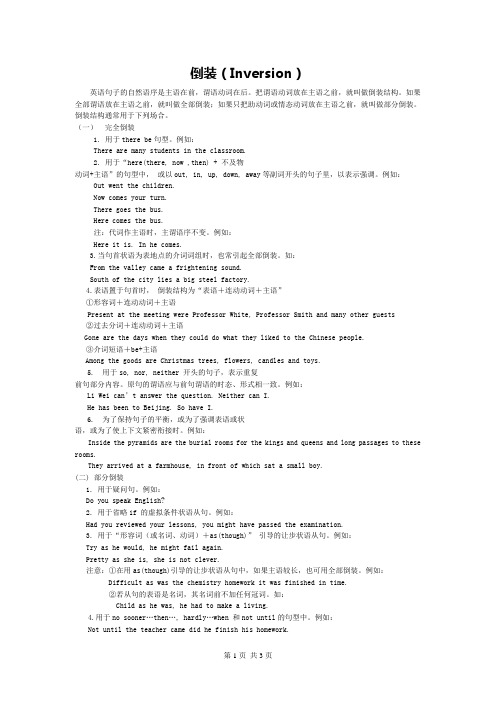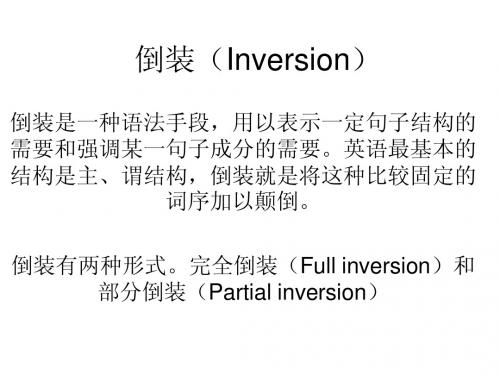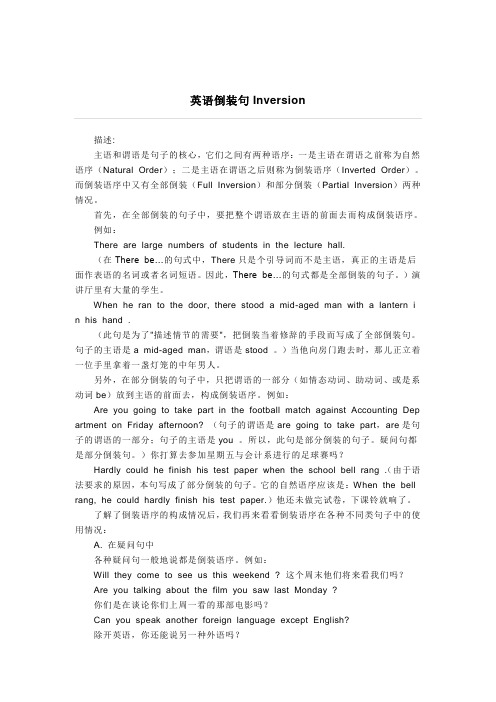inversion 倒装
Inversion倒装

Inversion倒装按“主语+谓语”这种顺序排列的句子是陈述语序,如果将某个句子成分移至句首而引起主语和谓语顺序的颠倒,使句子的排列顺序变为“谓语(或谓语的一部分)+主语”就是倒装句。
倒装有两种情况:完全倒装和部分倒装。
一、完全倒装Full Inversion (主语和谓语完全倒置)1.在there, here引导的表示存在的句型中,谓语是be,exist,stand,lie ,live等表示状态的不及物动词。
eg. There was a mountain long long ago. (从前有座山)There stood a temple at the top of the mountain. (山上有座庙。
)There loved three monks in the temple. (庙里有三个和尚。
)2.句子谓语是go,come,run等表示位置移动的动词和be动词,句中又有表示方位的副词(here,there,off,up,down,out,in,away等),当其主语为名词时,为了强调该副词,可将其放于句首,后面用陈述句语序,即主谓不倒装。
eg. There goes the bell ! 铃响了!Here comes your husband ! 你丈夫来了!Down come the rain ! 下雨了。
Here comes the train to Beijing. 去北京的火车来了。
Off goes the woman ! 那个女人走了。
Away went the boy to the school. 那男孩子到学校里去了!Here she comes. 她来了。
Here you are . 给你。
3.副词now,then,thus引导的句子里,谓语是come,follow,begin,and,be等。
eg. Now comes your turn !Then followed a shot of gun !Thus ended the meeting !4.为了强调句中的状语或表语,为了保持句子平衡或上下文衔接紧密,在叙述性和描绘性的书面语中,句中主语和谓语完全倒装,可将状语或表语置于句首。
倒装(Inversion)

用于某些祝愿的句子。 1) May you succeed! 2) Long live China!
注意: 代词作主语时, 主谓语序不变。
Here comes he. × Here he comes. Away went they. × Away they went.
The boy /He rushed out Out rushed the boy. Out he rushed
考点二:为了句子的平衡或 强调表语,将表语置于句首 时,句子用完全倒装。
在 so/such …that 的结构中,若so/such
置于句首,则句子部分倒装。
1) It is such an interesting book that John
has read it twice. Such an interesting book is it that John has read it twice. 2) It is so interesting a book that John has read it twice.
考点七 用于句首省略了if的虚拟条件句 子中并句中含有should, had或were. ① Should it rain, the crops would grow better. If it should rain, the crops would … ② Were there no steel, there would be no modern industry. It there were no steel, there would be … ③ Had it not been for the captain, the ship would have sunk. If had not been for the captain, the ship …
Inversion倒装

B
A. hangs
B. hang
C. hanging
D. hanged.
3. Only after liberation _____ B to be treated as human beings. A. they began B. did they begin
C. began they
C. do they begin
A. you can arrive there B. can you arrive there --- I don’t know, _____. B A. nor don’t I care C. I don’t care neither B. nor do I care D. I don’t care also B. arrive there you can D. there you can arrive
A. did the villagers realize B. the villagers realized
C. the villagers did realize
D. didn’t the villagers realize
7.Only by taking a taxi _____ C on time.
倒装句 inversion
主语和谓语是句子的核心,它们之间有两种 语序: 一是主语在谓语之前称为自然语序 (Natural Order); 二是主语在谓语之后则称为倒装语序 (Inverted Order)。 而倒装语序中又有完全倒装(Full Inversion)和部分倒装(Partial Inversion)
8. --- Do you know Jim quarrelled with his brother?
倒装(INVERSION)

倒装(Inversion)英语句子的自然语序是主语在前,谓语动词在后。
把谓语动词放在主语之前,就叫做倒装结构。
如果全部谓语放在主语之前,就叫做全部倒装;如果只把助动词或情态动词放在主语之前,就叫做部分倒装。
倒装结构通常用于下列场合。
(一)完全倒装1. 用于there be句型。
例如:There are many students in the classroom.2. 用于“here(there, now ,then) + 不及物动词+主语”的句型中,或以out, in, up, down, away等副词开头的句子里,以表示强调。
例如:Out went the children.Now comes your turn.There goes the bus.Here comes the bus.注:代词作主语时,主谓语序不变。
例如:Here it is. In he comes.3.当句首状语为表地点的介词词组时,也常引起全部倒装。
如:From the valley came a frightening sound.South of the city lies a big steel factory.4.表语置于句首时,倒装结构为“表语+连动动词+主语”①形容词+连动动词+主语Present at the meeting were Professor White, Professor Smith and many other guests②过去分词+连动动词+主语Gone are the days when they could do what they liked to the Chinese people.③介词短语+be+主语Among the goods are Christmas trees, flowers, candles and toys.5.用于so, nor, neither 开头的句子,表示重复前句部分内容。
英语倒装句(Inversion)

四、 平衡结构
3. 以副词here , there开头的句子,也采用完 全倒装来保持句子平衡。例子: Here is the letter you have been looking forward to. 你盼望已久的信在这儿。
A: His brother is(not) a college student; B: so is mine. (nor is mine .) A: He used to have his further study abroad; B: so did I. (neither did I.) A: One of my friends can speak three foreign languages; B: so can his wife. (neither can his wife .)
例子:
表示强调: 一、 表示强调
No sooner had I got home than it began to rain. 我刚到家就下起了雨。 Seldom do I go to work by bus. 我很少乘公共汽车上班。 Not ued last night .她昨晚十二点才上床睡觉。
表示强调: 一、 表示强调
3. so / such...that结构中的so或such位于句首可以 构成部分倒装句,表示强调so /such和that之间的 部分。 例: So unreasonable was his price that everybody startled. 他的要价太离谱,令每个人都瞠目结舌。 To such length did she go in rehearsal that the two actors walked out. 她的彩排进行得那么长,以 致于那两个演员都走出去了。
Inversion倒装

Inversion倒装 倒装
2. 以否定词开头作部分倒装 , 如 Not only…but 以否定词开头作部分倒装, also, Hardly/Scarcely…when, No sooner… than等. 等 Not only did he refuse the gift, he also severely criticized the sender. Hardly had she gone out when a student came to visit her. No sooner had she gone out than a student came to visit her. 注意:只有当Not only… but also连接两个分句时, 连接两个分句时, 注意:只有当 连接两个分句时 才在第一个分句用倒装结构. 才在第一个分句用倒装结构 . 如果置于句首的 Not only… but also仅连接两个并列词语,不 仅连接两个并列词语, 仅连接两个并列词语 可用倒装结构. 可用倒装结构. Not only you but also I am fond of music.
Inversion倒装 倒装
3. so, neither, nor作部分倒装 , 表示 " 也 " , 作部分倒装, 作部分倒装 表示" 也不" "也不". Tom can speak French. So can Jack. If you won't go, neither will I. 注意: 注意 : 当 so引出的句子用以对上文内容加以证实 引出的句子用以对上文内容加以证实 或肯定时 , 不可用倒装结构 . 意为 " 的确如 此". Tom asked me to go to play football and so I did. ---It's raining hard. ---So it is.
Chapter 24 Inversion(倒装)

注:但是当连接主语时不倒装
Neither he nor I has kept the secret.
Partial inversion
9. so…that/ such…that中 so+ adj./adv或 such…提前到句首时,此部分用倒装语序。如: So loudly did he speak that even people in the next room could hear him. So absurd did he look that everyone stared at him. In such a hurry did he leave that he forget to lock the door. Such a good voice did she have that she soon became a famous singer.
Full inversion
8. 在There be (exist, happen, live,
appear, lie, occur, seem, remain, stand等)句型中,构成完全倒装句。如:
There exist so many mistakes. There occurred a terrible accident at that time.
you with a cheque.
Partial inversion
3. 带有“not”的短语位于句首:not until, not a bit,
not once等 。如:
Not a bit am I afraid.
Not once did he talk to me.
倒装(Inversion)

倒装(Inversion)有时为了强调某一部分,或适应一定的语法结构的需要,而把谓语的全部或一部分提到主语的前面,这种情况叫“倒装”(Inversion)。
分为全部倒装与部分倒装。
1全部倒装1. 在there(appear to/happen to/seem to/used to/will)be /exist/lie/live/remain/come 结构中There exist many ancient temples. /There remainsa more difficult task.2. (1)在以here,there,now,then,out,in,up,down,away 等副词开头的名子里There goes the bell. /Out rushed the children.△但主语是人称代词时,主语和谓语的语序不变Here it is.(2)为了保持句子的平衡,或为了强调表语或状语,将其置于句首,主谓完全倒装In a big bed of a big room lies a big man. / Present at the meeting were CEOs.3.表示祝愿的句子Long live our great country4.直接引语的一部分或全部放在句首时,主语为名词时全部倒装(主语是代词时可倒可不倒)“ Let’s go” he said/said he. / said the man.2部分倒装1. 在疑问句中Is she a student?/ What does your mother do?△若特殊疑问句的疑问词做主语或修饰主语时,仍用陈述语序Who is on duty today?/ Which dictionary is yours?2. only+状语位于句首时Only in this way can you solve this problem.△only 修理饰主语位于名首时不倒装Only socialism can save China.3. 含有否定意义的副词、介词短语或连词位于句首时not,never,hardly,barely,seldom,little,few,nowhere,no,rarely,not only…but (also),not until,hardly/ scarcely… when,no sooner… than,at no time,by no means,in no way,By no means can he catch up in such a shorttime.4. so/such… that.. 句式中,so/such…位于句首时,主句倒装So angry was he that he couldn’t speak. / Such a good boy is he that we all like him.5. ①前提为肯定情况……也So+ be/助动/情动+主语He likes volleyball very much. So do I.②前提为否定情况…也不Neither/Nor+ be/助动/情动+主语I have never been abroad. Neither has he.6. as/though引导的让步状语从句,结构:adj./adv. /n./v原+ as+主语+ 其他Child as he is,he knows a lot. / Oldest as he is,he doesn’t do well in studies.注意:名词和形容词前,零冠词.7. 省略if的虚拟条件句中助词should/ were/had 位于句首时Were I you,I would work hard. / Should it rain tomorrow,we would put off our meeting.。
倒装(Inversion)

(4) Neither…, nor…表示“…不…,…也 不…”
Neither do I know it, nor do I care about it.
Neither is he foolish, nor is he lazy. (由于neither和nor都是否定词,所以前后 均需倒装)
(5) Not only…, but also…表示“不仅… 而且…” Not only will help be given to people to find jobs, but also medical treatment will be provided for people who need it. Not only did he hear it, but he saw it as well.
B (3) Only _____can answer the question.
A. can he
B. he can
only修饰主语时,句子不可倒装 Only he can answer the question.
2. 否定副词 never, nor, not, little, hardly, rarely, seldom, scarcely及表示否定意义的介词短语 at no time, in no case, by no means, on no condition 等至于句首时。 Never before have I seen such a moving film. Not a single mistake did he make.
Much as he likes the bike, he does not want to buy it. 注意:如果是单数名词或形容词最高级作表语, 省去冠词。 Child as he is, he knows a lot.
倒装(Inversion)

他。如果谓语放在主语前,这种语序就叫倒
装。倒装分:全倒装和部分倒装。在以下情 况可引起倒装:
• 1.一般疑问句中的倒装 • Don’t you speak English?(部分谓语放 在主语前) • 2.用于There be句型中的倒装 • There will be a meeting this afternoon.
• 2. He little realizes the danger he is in. • Little does he realize the danger he is in. • 3. Bethune was not only a doctor, but he was also a great communist fighter. • Not only was Bethune a doctor, but he was also a great communist fighter.
• 8. The animal hardly makes any movement when it is in its hibernating state. • Hardly does the animal make any movement when it is in its hibernating state. • 9. He had hardly sat down when the telephone rang. • Hardly had he sat down when telephone rang.
• Only then did l realize the trouble she was in. • 只是到了那时我才明白她所处的 困境。 • Not until yesterday did l know the news. • 直到昨天我才知道这消息。
Inversion 倒装句

Inversion 倒装句在英语中,主语和谓语的语序通常的主语在前,谓语在后。
但有时为了强调某一部分,或适应一定的语法结构的需要,而把谓语的全部或一部分提到主语的前面,这种情况叫“倒装”(Inversion)。
一、基本结构:完全倒装: 谓语+ 主语eg. In came the headmaster.部分倒装: 助动词/情态动词/be动词+主语+ V.…eg. Nothing do I care in my life.二、倒装的目的1、语法要求:疑问句,there be, 祝愿句2、修辞要求:为了强调;为描写生动;为衔接上下文;为平衡句子三、语法详解一)部分倒装1、never, often, seldom, little, nowhere, not, hardly,scarcely 等词位于句首时a. Never have I seen him before.b. Seldom do we go out.c. Little does he know what trouble he is in.Exercises:1)We are going nowhere at the weekend.2)He did not make a single mistake.3)We often warned them not to do so.2、Only + 状语,位于句首Eg. [Only in this way] can you work out the problem. 条件状语修饰整句Exercise:4)He was able to get back home only when the war was over.3、No so oner…than…;Hardly …when…; Scarcely …when…:(一……就……)位于句首Eg. Hardly had they gone out of the classroom when it began to rain.Exercises:5)He had no sooner arrived there than he fell ill.6)She had scarcely fallen asleep when a knock at the door awaked her.4、not …until… 或so ….that...位于句首Eg. Not until yesterday did I know the news.So loudly did he speak that even people in the next room could hear him.Exercises:7)I did not begin to do my homework until my mother came back.5、Not only…but also…连接两个句子时Eg. Not only was there no electricity at that time but also (there was) no water in the area. Exercises:8)He is not only an actor but also a writer.6、so/neither/nor引起的句子表示前面所说的情况也适用于另一个人Eg. He likes rice very well. So do I.I have never been abroad. Neither has he.* It was cold yesterday. So it was.Exercises:9)We saw the film last week. They saw it, too.10)I didn’t read the notice on the blackboard. He didn’t either.7、含有NO的介词短语位于句首Eg. At no time will China be the first to use nuclear weapons.By no means can teaching be separated from practice.8、省略了if 的虚拟条件句:虚拟条件句的谓语动词如果是were, had, should 时,可省略if, 但其谓语须倒装。
倒装句(Inversion)

倒装句(Inversion)一.倒装分为全部倒装和部分倒装。
谓语的全部放在主语之前,叫全部倒装;谓语动词不放在主语之前,而借助于助动词、情态动词等放在主语之前引起倒装,叫部分倒装,也叫局部倒装。
二.倒装的原因:一是语法结构的需要(如某些疑问句);一是为了强调。
三.用法:1.以here, there或out ,in ,up ,down ,away等副词开头的句子里,以示强调。
Eg : A : There goes the bell . B: Here comes the bus .C: Out rushed the children . D: Away went the boy .注:主语是人称代词时,主语和谓语的语序不变。
Eg: A: Here it is !B : Away he went .2. Only 修饰的副词、介词短语或状语从句放句首时。
Eg: (1) Only then did I realize that I was wrong .(2) Only in this way can you learn from your mistakes .(3) Only when the war was overin 1918was he able to gethappily back to work .3. 含有否定意义的副词或连词放句首时。
(1)never / seldom / littleeg : A. Never shall I forget it .B. Never have I heard such astrange story .C. Seldom did I hear such astrange story .D. Little does he care aboutwhat others think .(2)not / not until / not only ---butalso / neither--- noreg: A. Not a single mistake did he make .B. Not until midnight did the rain stop .C. Not only is he a worker , but also he is a writer .D. Neither is he a worker , nor is he a writer .(3)Hardly ---when / Scarcely---when / No sooner---thanEg: A. Hardly / Scarcely had Ireached the bus stopwhen the bus started .B. No sooner had I returned home than the telephone rang .4.副词so 放句首,表示前面所说的情况也适用于另一人或物。
英语倒装句(Inversion)

表示强调: 一、 表示强调
1.only +状语或状语从句置于句首 句子用部分倒 状语或状语从句置于句首,句子用部分倒 状语或状语从句置于句首 装。 Only in this way can you solve this problem. 只有用这种方法,你才可以解决这个问题。 , Only after he had spoken out the word did he realize he had made a big mistake.只有当他已经说 出那个字后才意识到自己犯了个大错误。
表示强调: 一、 表示强调
3. so / such...that结构中的so或such位于句首可以 构成部分倒装句,表示强调so /such和that之间的 部分。 例: So unreasonable was his price that everybody startled. 他的要价太离谱,令每个人都瞠目结舌。 To such length did she go in rehearsal that the two actors walked out. 她的彩排进行得那么长,以 致于那两个演员都走出去了。
四、 平衡结构
3. 以副词here , there开头的句子,也采用完 全倒装来保持句子平衡。例子: Here is the letter you have been looking forward to. 你盼望已久的信在这儿。
A: His brother is(not) a college student; B: so is mine. (nor is mine .) A: He used to have his further study abroad; B: so did I. (neither did I.) A: One of my friends can speak three foreign languages; B: so can his wife. (neither can his wife .)
unit10 Inversion倒装

十、形容词后的倒装形式
• A few very literary sentences begin with an adjective and include an inversion. • Blessed are the children who are still unaware of what the future holds. • Gone* are the days when I could have been happy. • * Here the past participle is used like an adjective. • 下面的句子不要求倒装 • Strange as it may seem, we were sorry to leave in the end.
三、倒装表示强调
• Little did she know how much work has left. • On no account must you sleep at class. • Never should you forget who your boss is. • Only then can it belong to me. • Here comes the moon. • All these structure are rather literary, which means there are more likely to appear in books.
• “I think it’s time to go, ” said Susan. • “It’s time for you, but not for me, ” replied Gary. • “Maybe we should collect our thoughts for a moment, ” commented Ian. • 注意:这种情况属于可选择的一种倒 注意: 装形式即可以倒装, 装形式即可以倒装,也可以选择不用 倒装。 倒装。
Inversion倒装

Etopialu 2020/5/14
Inversion 倒装 将某些句子成分移至句首而引起主语和谓语语序的颠倒,
称义(inversion)。倒装分为完全倒装和部分倒装两种。
1.完全倒装
1)结构:提前成分+谓语动词+主语 2)类型 a.将状语here,there 前移,谓语动词一般为be,come,go。 例如: There goes the bell. Let's begin our class. 但当主语为人称代词时不引起倒装。例如:Here he comes. b.表示位置转移的副词如up,down,in,out,away
Enjoy English!
Etopialu 2020/05/14
4. He spoke so impressively that everyone listened in awed silence. So _im__p__r_e_s_s_iv__e_l_y__d_i_d__h_e__s_p_e__a_k__t_h_a_t__e_v__e_r_y_o_n__e__li_s_t_e_n__e_d_ i_n__a_w__e__d__s_il_e_n__c_e_._
但only修饰其他成分不引起倒装。 Only Miller has got the invitation.
2.部分倒装
e. not only..but also...结构中当not only位于句首时not only 部分引起部 装。注意but also部分不引起倒装。 Not only could he drive but also he could ride a horse. 但not only...but also连接的并列主语不引起倒装。 Not only the children but also the grown-ups took interest in the cartoon. f.虚拟条件句的倒装结构 h.让步状语从句中的as倒装结构
英语倒装句Inversion

英语倒装句Inversion描述:主语和谓语是句子的核心,它们之间有两种语序:一是主语在谓语之前称为自然语序(Natural Order);二是主语在谓语之后则称为倒装语序(Inverted Order)。
而倒装语序中又有全部倒装(Full Inversion)和部分倒装(Partial Inversion)两种情况。
首先,在全部倒装的句子中,要把整个谓语放在主语的前面去而构成倒装语序。
例如:There are large numbers of students in the lecture hall.(在There be…的句式中,There只是个引导词而不是主语,真正的主语是后面作表语的名词或者名词短语。
因此,There be…的句式都是全部倒装的句子。
)演讲厅里有大量的学生。
When he ran to the door, there stood a mid-aged man with a lantern i n his hand .(此句是为了"描述情节的需要",把倒装当着修辞的手段而写成了全部倒装句。
句子的主语是a mid-aged man,谓语是stood 。
)当他向房门跑去时,那儿正立着一位手里拿着一盏灯笼的中年男人。
另外,在部分倒装的句子中,只把谓语的一部分(如情态动词、助动词、或是系动词be)放到主语的前面去,构成倒装语序。
例如:Are you going to take part in the football match against Accounting Dep artment on Friday afternoon? (句子的谓语是are going to take part,are是句子的谓语的一部分;句子的主语是you 。
所以,此句是部分倒装的句子。
疑问句都是部分倒装句。
)你打算去参加星期五与会计系进行的足球赛吗?Hardly could he finish his test paper when the school bell rang .(由于语法要求的原因,本句写成了部分倒装的句子。
inversion词典解释

inversion词典解释
根据英语词典的解释,inversion可以指以下几个含义:
1. (语法)倒装:在语法中,inversion指的是改变句子中词或短语的次序,以更强调某个信息或实现更艺术的表达方式。
常见的倒装形式包括主谓倒装、完全倒装和否定词倒装。
2. (音乐)转位:在音乐中,inversion指的是将和弦的音符改变顺序,使原本的根音成为较低音声部的一个音符,即将音符上移或下移一个八度。
3. (气象学)逆温层:在气象学中,inversion指的是大气层中温度随高度变化的模式,通常是指逆温层,即在一定高度上空温度增加而不是减少。
4. (地质学)逆转:在地质学中,inversion指的是地壳中断层运动的特殊类型,即一块地壳块的上下方向发生逆转。
总之,inversion可以指语法上的倒装、音乐中音符的转位、气象学中的逆温层,以及地质学中的逆转。
具体指代的意义需要根据上下文来确定。
- 1、下载文档前请自行甄别文档内容的完整性,平台不提供额外的编辑、内容补充、找答案等附加服务。
- 2、"仅部分预览"的文档,不可在线预览部分如存在完整性等问题,可反馈申请退款(可完整预览的文档不适用该条件!)。
- 3、如文档侵犯您的权益,请联系客服反馈,我们会尽快为您处理(人工客服工作时间:9:00-18:30)。
第二十八章倒装Chapter 28 Inversion英语中的语序通常是主语在前,谓语动词在后。
所谓倒装就是把动词放在主语之前。
这种情况出现在疑问句中,也出现在其他一些特殊情形下。
28.1 两种倒装 (Two types ofinversion) | 28.2 | 28.3 | 28.4 | 28.5 | 28.6 | 28.7 | top | 倒装一般分为两种,即主谓倒装和主语/功能词倒装。
28.1.1 主谓倒装 (Subject-verb inversion)主谓倒装,又称为全部倒装(Full inversion),即把整个谓语动词放在主语之前。
这一类倒装主要出现于地点状语后面,said John, answered Peter等有直接引语的结构中以及表语提前的情况下。
例如:--At the far end of the room stood a tall policeman.--“I love you,” whispered John.--Completely different is the last story.28.1.2 主语/ 功能词倒装 (Subject-operation inversion)这种倒装又称为部分倒装,即把功能词(助动词或情态动词)放在主语之前,动词的其余部分依然在主语之后。
如果句中没有助动词或情态动词,则要加一个助动词do, does或did。
例如:--He had no money, nor did he know anyone he could borrow from.--On no account must this switch be touched.--Only by chance did I hear that her mother had died.--Were she alive today, she would grieve at the changes.28.2 在以neither, nor, so等开始的句子中 (Sentences beginning with neither, nor, so, etc.)| 28.1 | 28.3 | 28.4 | 28.5 | 28.6 | 28.7 | top | 用neither, nor和so引导的句子表达某人、某事或某种情况与刚才提到的相同,在这种情况下必须要用倒装。
neither, nor表示“也不…”;so表示“也如此”。
这种倒装是部分倒装。
--“I didn’t get much sleep last night.” “Neither/Nor did I.”--“My husband never touches a drying-up cloth.” “Neither does mine.”--He refused to apologize. Neither/Nor would he offer any explanation.--All the students were obviously very miserable. Nor were the teachers satisfied with theconditions at the school.--John saw the accident and so did Mary.--She was angry and so was I.请比较下面两句中so和neither/nor 表达截然不同的意思。
--The corn is ripening, and so are the apples.--The corn isn’t ripening, and neither/ nor are the apples.请注意:a. so放在句首也可以用来表达另外一种意思,即对于别人讲的情况加以肯定,表示附和。
在这种情况下,不用倒装。
请比较:--“You’ve spilled coffee on your dress.” “ Oh, dear. So I have.” (哎哟,真的呀。
) --You’ve spilled coffee on the table, and so have I. (=…, and I’ve spilled coffee on the table, too.)--“That’s Isabel, look!” “So it is!” (就是她)--“I’m having a tooth out tomorrow.” “So am I.” (=…, I am having a tooth out tomorrow, too.)--You asked me to leave, and so I did. (你叫我走,我就走了。
)--You asked him to leave, and so did I. (你叫他走,我也叫他走啊。
)b. neither虽然放句首,但是其中心词作句子主语时,不用倒装。
例如:--Neither of them wanted to stay.c. Neither…nor…句型中的nor分句也应该用倒装。
如:--Sam neither has long hair, nor does he wear jeans.--Mary was neither happy, nor was she sad.--They have neither replied to my letters, nor have they answered my telephone calls.28.3 在以否定副词(如hardly, never等)开始的句子中 (Sentences beginning with negative adverbexpressions: hardly, never,etc.) | 28.1 | 28.2 | 28.4 | 28.5 | 28.6 | 28.7 | top |在正式文体中,许多表达否定意义的副词或状语词组可以放在句首。
在这种情况下,必须用部分倒装。
表达否定意义的副词和词组常见的有seldom, rarely, scarcely, hardly, never, few, little, invain, much/ even/ still less, 以及含有no/ not的词组/句型如no sooner…(than), on no account, inno circumstances, in no way, by no means, at no time, no longer, not until, nowhere等等。
例如:--Seldom had I seen such confusion.--Never in history had technology made such spectacular advances.--Hardly had I arrived when a quarrel broke out.--No sooner was she back at home than she realized her mistake.--At no time was the entrance left unguarded.--Not till he got home did he realize that he had lost it.--On no account must this switch be touched.--In no circumstances must the door be left open.--In no way can Mrs. Pethers be held responsible.--To no one will they admit their guilt.注意,如果位于句首的这种否定词/词组是作句子主语,句子不需要倒装。
如:--Little help can be expected from Peter.--Not a single word that he said entitles you to make that accusation.--No honest man would lie.--Not many people came to the party.28.4 在以表示地点或方向的副词(如here, there, down, away等)开始的句子中 (Sentencesbeginning with adverbs of position and direction: here, there, down, away, etc.)| 28.1 | 28.2 | 28.3 | 28.5 | 28.6 | 28.7 | top | 当表示地点或方向的副词位于句首时,句子可用全部倒装。
句中的谓语动词常常是come, lie,stand, walk, live等不及物动词或是系动词be。
在文学性和描写性文章中采用这类倒装主要是为了使其更加生动,而把主语置于句末则是为了使之成为信息中心。
--Down fell a dozen apples.--Away goes my chance of winning!--In walked a man dressed in a black gown.--Next to it stood a pile of paper cups.--A few miles further on lies the enchanting suburb of Balham, gateway to the South.--Over the bridge marched the soldiers.--On the very top of the hill lives a hermit.以上例句也可以不用倒装而用正语序,如:--A dozen apples fell down.--My chance of winning goes away.--A man dressed in a black gown walked in.但是如果主要动词是be时,句子总是用倒装,这时将be动词置于主语之前。
例如:--Below is a restaurant.--Next to it is a different sign which says simply “Beware”.--Alongside him on the rostrum will be Mr. Mitchell Fromstein.以here, there开始的倒装句在口语中尤其多见。
